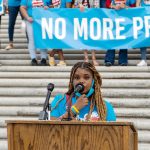Parents and legal advocates in Louisiana — chief among them Black mothers — say a plan to temporarily transfer incarcerated youth to an adult facility once known as “America’s bloodiest prison” will traumatize the children and limit their access to education and rehabilitation opportunities.
Under the plan from Democratic Gov. John Bel Edwards, about two dozen juveniles are being transferred from the Bridge City Center for Youth to the Louisiana State Prison at Angola until some time in 2023. According to reports, the first set of youth was transferred this week. Governor Edwards’ office did not immediately respond to The 19th’s request for comment.
Angola — which is notorious for its violence — is the largest maximum-security prison in the United States and is named for the former slave plantation that previously occupied its grounds. In recent years, men incarcerated at Angola have been forced to pick cotton on the same land on which Black men and women were once enslaved. The wing where the youth will be held is the former death row of the prison.
The governor’s plan comes after six youths escaped from the Bridge City facility and one of them was subsequently accused of committing a carjacking that left a man critically injured.
The decision to move youths to Angola has faced criticism from the ACLU, Southern Poverty Law Center, Families and Friends of Louisiana’s Incarcerated Children (FFLIC) and Youth Correctional Leaders for Justice, a group of current and former youth correctional administrators who urged against the plan in a letter to Edwards in which they stated, “Young detainees engaged in ‘problematic behavior’ do not yet have fully developed brains and need education, support, and to believe in their potential.”
Gina Womack, founder of FFLIC, said she agreed with the former correctional administrators’ assessment.
“Young people need to have access to equitable education,” Womack told The 19th. “Children need to be identified with their learning styles. Our state preamble states that every child should be afforded an individual educational opportunity and have access to that.” She further noted that a lot of these provisions were included in the Juvenile Justice Reform Act of 2003, but the legislation was never fully carried out.
“Because of the lack of diligence of our lawmakers, we’re losing generations of children,” she said.
Womack said she believes the move is an attempt to scapegoat incarcerated youths when the government had refused to implement rehabilitative services and crime prevention measures.
The ACLU and several law clinics in Louisiana had sued the state to stop the plan from advancing. But in a ruling last month that paved the way for the moves to begin, U.S. District Judge Shelly Dick decided not to block the plan. In doing so, though, Dick noted, “The prospect of putting a teenager to bed at night in a locked cell behind razor wire surrounded by swamps at Angola is disturbing.”
In a proclamation released at the end of last month, President Joe Biden recognized October 2022 as National Juvenile Justice Action Month. Noting that young people of color and youth with disabilities are disproportionately represented among the 36,000 young Americans who “remain confined in juvenile residential facilities, too often stuck in unsafe environments, facing adult charges or severe sentences and living with untreated trauma that keeps them from moving forward,” Biden pledged to stand with youth justice advocates to work to build a system “focused on redemption and rehabilitation, especially for our children.”
Advocates say that even with this acknowledgment of the need for rehabilitative — rather than punitive — support for children on the federal level, across the country young people — predominantly youth of color — continue to be funneled down the school-to-prison pipeline. And youth incarceration impacts children, as well as their families and broader communities.
That is why Womack founded FFLIC over 20 years ago. The group brought together parents — many of them Black mothers like Womack — who were committed to advocating and supporting their children who were being caught up in the youth incarceration system.
Largely because of the work of FFLIC, the Tallulah Youth Correctional Facility was closed and the Juvenile Justice Reform Act of 2003 was passed. More recently the group has rallied to protest Edwards’ plan for Angola. As the youths are now in the process of being transferred, Womack noted that the group is committed to fighting for them and other youths by uplifting FFLIC’s three-point plan which includes fighting to end poverty and for mental health and educational resources.
For young people and their families, the trauma of the impending move began almost immediately after the plan was announced. According to Aaron Clark-Rizzio, the executive director of the Louisiana Center for Children’s Rights, upon learning about the pending move, youths housed at the Bridge City Center began setting up protocols wherein they would call their mothers at the same time every day to inform them that they had not yet been moved.
“I do not believe Angola is a place for any child, and as a parent, I strenuously disapprove of the decision to move my son and any other youth to a facility located there,” the mother of one Bridge City youth told Dick’s courtroom. The lawsuit filed on the youths’ behalf says her 17-year-old son Alex struggles with PTSD and has lost sleep and begun pulling out his hair at the prospect of being moved to Angola. He said that his one solace is being able to speak to his mother for 15 minutes each day. He believes that she is the only one who really listens to him.
In a video that has been posted on FFLIC’s Facebook page, a mother describes how she cries herself to sleep and she is stressed as she waits by the phone every night. She talks about how her son and other minors have been placed into a traumatic environment, while at the same time being deprived of mental health services and rehabilitation resources.
“When they took him into custody I was with the understanding that he would get the help he needed to be a productive citizen, and all this did was make everything worse…They told him to adapt to the environment and survive, and now I pray that the court allows my son to be released so that I can begin healing and rehabilitating him,” she said.







